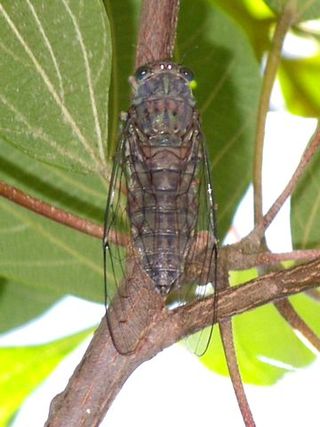
Genus is a taxonomic rank above species and below family as used in the biological classification of living and fossil organisms as well as viruses. In binomial nomenclature, the genus name forms the first part of the binomial species name for each species within the genus.

Amphipoda is an order of malacostracan crustaceans with no carapace and generally with laterally compressed bodies. Amphipods range in size from 1 to 340 millimetres and are mostly detritivores or scavengers. There are more than 9,900 amphipod species so far described. They are mostly marine animals, but are found in almost all aquatic environments. Some 1,900 species live in fresh water, and the order also includes the terrestrial sandhoppers such as Talitrus saltator and Arcitalitrus sylvaticus.

Tosenini is a tribe of cicadas in the family Cicadidae. There are at least 10 described species in Tosenini, found in the Palearctic and Indomalaya.
ZooKeys is a peer-reviewed open access scientific journal covering zoological taxonomy, phylogeny, and biogeography. It was established in 2008 and the founding editor-in-chief was Terry Erwin until his death in 2020. In December 2023, Torsten Dikow was appointed the new editor-in-chief. It is published by Pensoft Publishers.
BIOSIS Previews is an English-language, bibliographic database service, with abstracts and citation indexing. It is part of Clarivate Analytics Web of Science suite. BIOSIS Previews indexes data from 1926 to the present.

The Diplodactylidae are a family in the suborder Gekkota (geckos), with over 150 species in 25 genera. These geckos occur in Australia, New Zealand, and New Caledonia. Diplodactylids are the most ecologically diverse and widespread family of geckos in both Australia and New Caledonia, and are the only family of geckos found in New Zealand. Three diplodactylid genera have recently been split into multiple new genera.

Turridae is a taxonomic family name for a number of predatory sea snails, marine gastropod mollusks in the superfamily Conoidea.
Barbara Baehr is a German research scientist, entomologist, arachnologist, and spider taxonomist. She has described over 400 new spider species, mostly from Australia. She is originally from Pforzheim, Germany.

Megatibicen is a genus of cicadas in the family Cicadidae, with about 10 described species. Until 2016, these species were included in the genus Tibicen and then briefly in Neotibicen. The species formerly of genera Ameritibicen Lee, 2016 and Gigatibicen Lee, 2016 are now considered species of Megatibicen Sanborn & Heath, 2016.

Cicadettini is a tribe of cicadas in the family Cicadidae. There are at least 110 genera and 520 described species in Cicadettini, found worldwide except for the Neotropics.
Hemidictyini is a tribe of cicadas in the family Cicadidae, found in the Neotropics and tropical Africa. There are at least two genera and two described species in Hemidictyini.
Prasiini is a tribe of cicadas in the family Cicadidae. There are about 9 genera and at least 50 described species in Prasiini, found in tropical Africa, Australasia, and the Neotropics.
Durangona is a genus of cicadas in the family Cicadidae and the monotypic tribe Durangonini, found in South America.
Lacetas is a genus of cicadas in the family Cicadidae, and the tribe Hemidictyini found in Africa. There are at least four described species in Lacetas.

Leptopsaltriini is a tribe of cicadas in the family Cicadidae. There are at least 200 described species in Leptopsaltriini, found in the Palearctic, Nearctic, and Indomalaya.

Macrotristriini is a tribe of cicadas in the family Cicadidae. There are at least 2 genera and 20 described species in Macrotristriini, all found in Australia.

Psaltodini is a tribe of cicadas in the family Cicadidae, found in Australia. There are at least 3 genera and about 17 described species in Psaltodini.

Tamasini is a tribe of cicadas in the family Cicadidae, found in Australia. There are at least two genera and about eight described species in Tamasini.
The Wells and Wellington affair was a dispute about the publication of three papers in the Australian Journal of Herpetology in 1983 and 1985. The periodical was established in 1981 as a peer-reviewed scientific journal focusing on the study of amphibians and reptiles (herpetology). Its first two issues were published under the editorship of Richard W. Wells, a first-year biology student at Australia's University of New England. Wells then ceased communicating with the journal's editorial board for two years before suddenly publishing three papers without peer review in the journal in 1983 and 1985. Coauthored by himself and high school teacher Cliff Ross Wellington, the papers reorganized the taxonomy of all of Australia's and New Zealand's amphibians and reptiles and proposed over 700 changes to the binomial nomenclature of the region's herpetofauna.
Richard Walter Wells is an Australian herpetologist. He is known for editing the Australian Journal of Herpetology in the 1980s, in which he and C. Ross Wellington wrote and published three papers without academic peer review that proposed significant changes to the taxonomy and nomenclature of Australian reptiles and amphibians. In the 2000s, Wells self-published herpetological research in the Australian Biodiversity Record. The scientific names he proposed therein are the subject of a boycott begun in 2013 by some members of the herpetological community.











